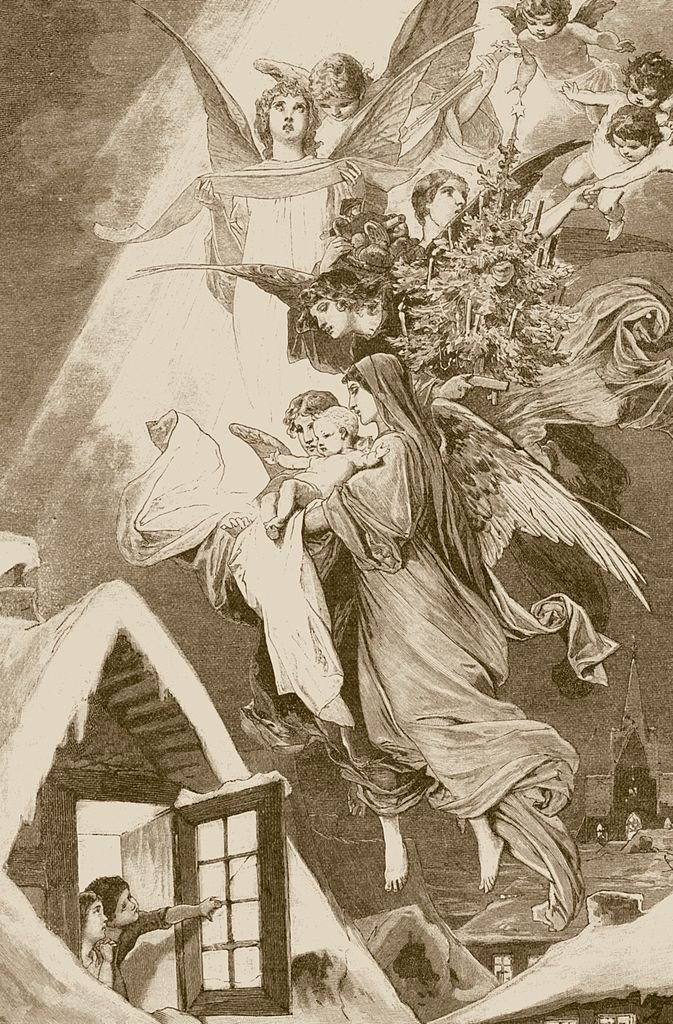3 December 2021
Kris Kringle is another name for Santa Claus. The name is a variation on the German Christkind, or Christkindl (Christ-child), a traditional gift-bringer at Christmas-time in Germany, Switzerland, Austria, and elsewhere. The alteration of the name into English happened in the United States in the first half of the nineteenth century, when the tradition, brought to the Americas by German immigrants, collided with the English language.
The earliest conflation of the Christkindl with Santa Claus or Saint Nicholas that I can find is in an 1828 collection of New York traditions by a John F. Watson:
The Dutch kept five festivals, of peculiar notoriety, in the year—say, Kerstydt, (Christmas); Nieuw jar, (New Year,) a great day of cake; Paas, (the Passover); Pinxter, (i.e., Whitsuntide); and San Claas, (i.e. Saint Nicholas, or Christ-kinkle day.)
We see the Kris Kringle spelling by 1841, as evidenced by this advertisement for children’s books that appeared in Philadelphia’s Christian Observer on 3 December 1841:
J. Whetham & Son, 144 Chestnut st., opposite the Theatre, have constantly on hand and for all the latest and most interesting juvenile books. Among their large assortment are the following:
The Kris Kringle’s Book, or the Book of St. Nicholas—Merry’s Moral Tales—The Land Without the Sabbath—Samuel Wisdom [...]
And there is this over-the-top sententious story by James Rees that appears in his 1849 Mysteries of City Life:
Their daughter now spoke. “Mother, I have tied my stocking to that big nail near the fire place, do you think KRIS KRINGLE will come down the chimney to-night?”
“O, sister, what nonsense,” quickly replied the boy, “how can such a huge figure as he is represented get down our poor chimney!”
“That is it, my child—it is because we are poor. Poverty keeps from the humble door all the bright things of the earth, except virtue, truth, and religion, these are more of heaven than of earth, and are the poor man's friend in his hours of adversity.”
“Then, father, I will take my stocking down, I thought, indeed, mother, I thought that Santa Claus and Kris Kringle loved all those who are good, and have not I been good? I know my lesson, I love you, mother, and my brother dearly, and do whatever I am told.”
So, by the mid nineteenth century, the transition from Christ child to Santa Claus was complete, and Kris Kringle was just another name for the right jolly old elf.
Sources:
“New Juvenile Books” (advertisement). Christian Observer (Philadelphia), 3 December 1841, 195. Readex: America’s Historical Newspapers.
Oxford English Dictionary, second edition, 1989, s.v. Kris Kringle, n.
Rees, James. Mysteries of City Life. Philadelphia: J.W. Moore, 1849, 93. HathiTrust Digital Archive.
Watson, John F. “Appendix: Containing Olden Time Researches and Reminiscences of New York City” (1828). Annals of Philadelphia. Philadelphia: E.L. Carey and A. Hart, 1830, 37. HathiTrust Digital Archive.
Image credit: unknown artist, Stadt Gottes, 1893. Public domain image.

